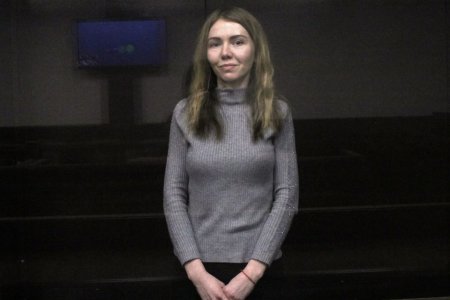
Two Ukrainians - 29-year-old Aliona Holtvenko and Oleksandr Saakian – have received 18 and 22-year sentences, respectively, for setting fire to three cars with the Z-symbol indicating support for Russia’s full-scale invasion of Ukraine. The aggressor state, which is claiming that its merciless bombing and destruction of Mariupol was ‘liberation’, called the Ukrainians’ act of resistance ‘terrorism’.
The two Ukrainians were ‘tried’ at Russia’s notorious Southern District Military Court in Rostov, with the hearings seemingly behind closed doors. Although the Russia’s prosecutor’s report on 11 March 2025 claimed that the sentences, were for “a series of acts of terrorism and spying”, the only actual incidents mentioned were seemingly against cars. Russia’s prosecutor general claimed that the two had set fire to three cars bearing “symbols representing support for the special military operation” [i.e. Russia’s euphemism for its war against Ukraine]. Each of these was treated as a separate episode of supposed ‘terrorism’.
Russia, as an occupying state, is prohibited by the Fourth Geneva Convention from both illegally transferring Ukrainians to Russian territory and applying its legislation. Russia’s violation of international law may seem so standard that it does not seem worth mentioning, but this, nonetheless, should not be forgotten.
Aliona Holtvenko was sentenced to 18 years over the three cars, with each treated as a separate ‘terrorist episode’ under Article 205 § 2 a & c of Russia’s criminal code and taking part in a terrorist organization (Article 205.4 § 2).
Oleksandr Saakian was found ‘guilty’ of spying (Article 276 of Russia’s criminal code); of forging a passport (Article 327 § 3); of possession, purchase, etc. of explosive devices or substances (Article 222 § 4); of involvement in a terrorist organization (Article 205.4 § 2); of acts of terrorism or planning such (Article 205 § 2). It was claimed that he had ‘recruited’ Holtvenko into this fictitious ‘terrorist organization’, with that treated as Article 205.1 § 1.1).
He was sentenced to 22 years’ maximum-security [‘harsh-regime’] imprisonment, with the first two years in a prison (the worst of Russia’s penal institutions), the remainder in a prison colony. A steep 550 thousand rouble fine was also imposed.
The prosecution claimed that Saakian had joined “a terrorist organization” in May 2022 and had drawn Holtvenko into this. The ‘spying’ is claimed to have been from March to June 2022 in that the Ukrainian passed on information to Ukraine’s Security Service about the position of Russian anti-aircraft systems being used as part of the Russian invading army’s attack on Saakian’s country. He was also accused of having planned to blow up a car carrying Russian invaders in Mariupol, but was, purportedly, seized by the Russian FSB when he tried to take explosives from a secret stock.
Oleksandr Saakian (b. 12 May 1994) is from Vinnytsia oblast and is a former (possibly serving) member of the Ukrainian Armed Forces Azov Regiment. Citing Ukrainian databases, the Memorial Support for Political Prisoners Project reports that Saakian disappeared in Mariupol on 23 March 2022.
Aliona Holtvenko (b. 7 December 1995) was, until Russia’s full-scale invasion of Ukraine, a policewoman. Both were, therefore, in particular danger after Russia seized control of Mariupol. The Media Initiative for Human Rights has learned from a friend of Aliona’s that the young woman remained in Mariupol to care for her elderly grandmother. As well as trying to survive by selling medicines at a market, she helped Ukraine’s Armed Forces and passed on information about the deployment of Russian military forces. At the beginning of Russia’s occupation of the city, the invaders tried to get Aliona to betray her oath of allegiance to Ukraine and collaborate with them. She refused, with this meaning that she was forced to undergo Russia’s so-called ‘filtration’.
The Russian reports claim that the two Ukrainians were ‘detained’ in 2024. It is unclear whether this is true, however she has been held prisoner at a SIZO [remand prison] in Rostov for the past year. She and other Ukrainian female hostages are held separately from the others, and Aliona in her letters to her family has expressed concern about her fellow captives. The conditions in all Russian penal institutions, especially SIZO, are appalling, and Ukrainians are almost certainly treated even worse. Before Russia’s full-scale invasion, Aliona liked to play the piano and draw in her spare time and she is apparently drawing the other hostages in SIZO.
Mediazona earlier reported that Aliona Holtvenko is one of ten women known to be in SIZO No. 1 in Rostov. The others are: Anna Voshkoder (b. 1997); Valentyna Zaiarna (b. 1960); Oksana Ivanchenko (b. 1976); Kateryna Korovina (b. 1996); Darya Kulik (b. 2004); Larysa Malovychko (b. 1968); Anna Murdid (b. 1976); Anzhela Nikolayenko (b. 1980); and Anastasia Todurova (b. 1990).



